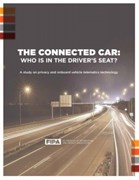2016 Bi-monthly Update Series: September-October
In our 2015 year-end update, we promised to provide bimonthly updates to new resources and services added to Clicklaw in those two months. Here is a sample from the changes in September and October:
Jan-Feb | Mar-Apr | May-Jun | Jul-Aug | Sep-Oct | Nov-Dec
 The Connected Car
The Connected Car
by BC Freedom of Information and Privacy Association
The report outlines how data culled from vehicle telematics and infotainment systems can be used for safety, monitoring, customer relationship management etc. Yet some data harvested from cars can also be used to track and profile customers for marketing and other purposes.
 Starting a Small Business in BC Guide
Starting a Small Business in BC Guide
by BC Ministry of Jobs, Tourism and Skills Training and Responsible for Labour
This 2016 edition is an introductory guide to help you with planning, implementing, and developing a small business. It provides essential information you need to know as well as links to additional resources to help ensure that your new business is successful.
![]() Legal Workshop videos
Legal Workshop videos
by Cerebral Palsy Association of British Columbia
The videos from CPABC’s legal workshops include topics such as workplace discrimination, victims of crime, and rights for youth in transition.
 BC Judicial Review Self-Help Guide
BC Judicial Review Self-Help Guide
by Community Legal Assistance Society (CLAS)
Have you received a decision from the BC government or a tribunal (decision maker) that you think is seriously flawed or unfair? After you have gone through all your appeal options within the system, you may be able to ask a judge to review the decision.
CLAS has a guide for people who are representing themselves in a judicial review. We have now updated and modified this guide into a web-based form where users can navigate through the judicial review process for their selected tribunal. This website gives an overview of options that people have, step-by-step information about filing court documents, and templates that people can use when self-representing in Court. The website also allows people to get in touch with CLAS lawyers to ask for information and advice about their situation.
 BC Disability Benefits Help Sheets
BC Disability Benefits Help Sheets
by Disability Alliance BC
As of September 2016, Disability Alliance BC has fully updated their Help Sheet series to reflect the changes to the PWD benefit, including a rate increase and changes to the BC Bus Pass Program.
 Emily’s Choice
Emily’s Choice
by Legal Services Society
Emily’s Choice uses storytelling and images to describe child protection. Co-produced with the Healthy Aboriginal Network, the video and graphic novel tell the story of Emily, who struggles with addiction and an unhealthy relationship. She loves her son, Greg, but can’t always take care of him. When he goes into foster care, she gets legal help and family support to get him back.
The webpage provides links to the video, trailer, online version of the graphic novel, ordering information, who can help, and promotional material.
 The Factum
The Factum
by Legal Services Society
The Factum is a Legal Services Society blog about the law in British Columbia and how people can navigate the legal system. While it talks a bit about all aspects of the law, it focuses mainly on how the legal system affects people who can’t afford a lawyer.
Civil Resolution Tribunal- BC’s New Online Tribunal![]() (Webinar recording)
(Webinar recording)
by Civil Resolution Tribunal and Courthouse Libraries BC
This webinar focused on the recent changes to the strata dispute process brought about in the Civil Resolution Tribunal Amendment Act and served as an introduction to the CRT’s resolution services (including guides, videos and sample document templates) and their Solution Explorer software tool.


